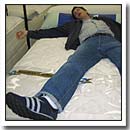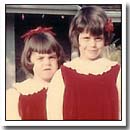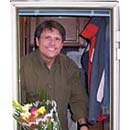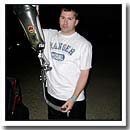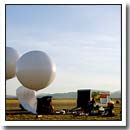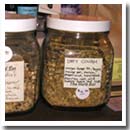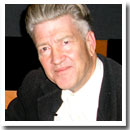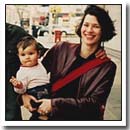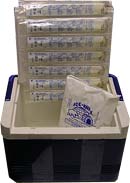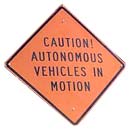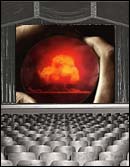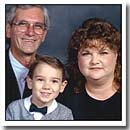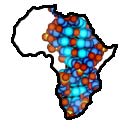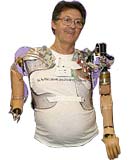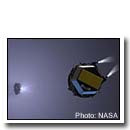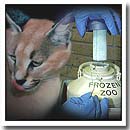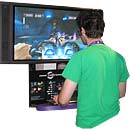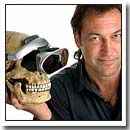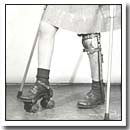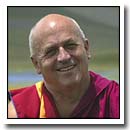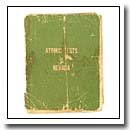 |
||
|
|
 |
|||||||

|
How did your life collide with the headlines in 2007? What's your holiday performance story? |
You spend about a third of your life sleeping, so finding the right mattress is important. Problem is, finding the right mattress can also be very time consuming. How do you find the right one for you? Host Bill Radke went on a quest with a physical therapist to find the perfect mattress for a good night's sleep. (01/04/06) Online resources:
When the Shuttle Columbia broke up in February 2003, one thing did survive intact -- scientist Robert MacLean's bacteria experiment. After traveling well over the speed of sound, a strain of bacteria in the original container managed to survive the disaster. Weekend America's Alex Cohen talks to MacLean about what the bacteria's survival means for his future experiments. (03/25/2006) Online resources:
Weekend America looks at the state of sleep in America starting with Ed Murphy who has a serious case of sleep apnea. Bill Radke then talks about other sleep problems with Dr. Larry Epstein, President of the American Academy of Sleep Medicine at Harvard Medical School. (03/25/2006) Online resources:
KUOW's Cathy Duchamp explains that when her sister, Christine Jertberg, was diagnosed with cancer, they both felt helpless and out of control. Duchamp says she really didn't know what to do, or how to help her. And then she found a research project called the Sister Study that offered a way out of her helplessness. Duchamp shares her story. (03/18/2006) Online resources:
Gregg Gour has lived with AIDS for two decades. When he chose to stop taking his meds, Greg bought an RV and journeyed across the country to say goodbye to his loved ones. Host Barbara Bogaev talked to Greg and some of his friends he visited along the way: Jim Catalano of San Diego, California and Marcia Ellison, of Scottsdale Arizona. (03/11/2006) Online resources:
Weekend America looks at the developments made in prosthetic limbs, partially as a result of the war in Iraq. Host Bill Radke talks to Shari Roan, who has done a survey of state-of-the-art prosthetics for the Los Angeles Times. She introduces us to National Guardsman Mike McNaughton, who has the most technologically advanced prosthetic knee available. (03/11/2006) Online resources:
As war has become more sophisticated, so has the medical technology used to heal American soldiers. But physical treatment is only part of what's needed before the wounded can resume a regular life. Host Bill Radke talks to Wayne Miller, a Vietnam-era amputee who counsels returning troops about post-traumatic stress disorder. (Miller also inspired the character of Elias, who does the same thing in the comic strip, Doonesbury.) (03/11/2006) Online resources:

Prepare yourself for another series of sunspots. Not too long ago, this activity created on the surface of the sun was virtually unnoticed by everyday people. But it could wreak havoc for folks living in today's high-tech age. Host Bill Radke talks to a solar expert about the cosmic phenomenon and its implications. (03/11/2006) Performance information:
After years of serving low-nutrition foods in the Berkeley public school system, school officials decided to do something about it. They adopted something called the School Lunch Initiative, which proposes to turn lunchtime into an academic subject. Its goal is to teach children better eating habits and an awareness of the entire food chain: both natural and industrial. Reporter Chad Heeter gives us a taste of the new program. (03/04/2006) Online resources:
Are school programs like the one implemented in Berkeley, California effective in teaching kids better eating habits? Host Barbara Bogaev explores that with Matt Longjohn, the executive director of the Consortium to Lower Obesity in Chicago Children. (03/04/2006) Online resources:
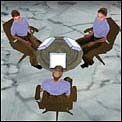
In some online games, you get to create a digital self, or an avatar to interact with other player's characters. Do these interactions mean anything? Jeremy Bailenson thinks so. He heads the Virtual Reality Lab at Stanford University. He says our digital selves can actually influence the real "us" in surprising ways. He joins Weekend America's John Moe to talk about virtual reality. Online resources:
Why wait around for the next space shuttle when you can take a space elevator? The idea isn't so far fetched. As a matter of fact, an experimental space elevator was just tested. Guest-host Alex Cohen talks about the results with the head of the company that built it, Liftport CEO Michael Laine. (02/18/2006) Online resources:
It seems teenagers have always done things to shock their parents. But not every crazy act a teenager does can be simply labeled "teen behavior." The act of "cutting" is one example. Why do teens cut themselves? First, we hear a story from high school student Amanda Wells, who sits down with a friend to learn why she cuts. Then, host Barbara Bogaev has a conversation with Matthew Selekman, a family therapist about how parents need to respond. (02/18/2006) Online resources:
One in ten children in the U.S. struggle with asthma daily. In urban areas, the rate is often higher. With the help of medication, it's possible to keep the condition mostly under control. But as Pamela Renner reports, some hospitals are trying a more innovative approach. (02/11/2006) Online resources:

If you use Google or another search engine to find information online, you may not realize that you are leaving a trail of all the sites you've accessed. This week we learned federal investigators want to follow that trail. The government says the information would be used to help regulate online pornography. MIT Professor Sherry Turkle talks with host Barbara Bogaev about the intimate relationship that one develops with their search engine. (01/21/2006) Online resources:

We all put notes on calendars and in notebooks to remind us of things in the days and months ahead. But what if there will be a serious matter you need to address say, in 30 years? There's a new Web site that can help remind you of those long-term issues. Host Bill Radke talks to Mat Sly about why he helped create the Web site, FutureMe.org. (01/21/2006) Online resources:
At the office, the grocery store, even at this week's Alito nomination hearings, it seems like there's an inordinate amount of coughing going on. Welcome to the cold and flu season. This week, the American College of Chest Physicians advised those battling a cough to pass on those over-the-counter cough suppressants, saying they don't work. Weekend America sent reporter Alex Cohen to see what might help. (01/14/2006) Online resources:
Director David Lynch creates images that are hard to forget. From the TV series "Twin Peaks" to films like "Mulholland Drive" and "Blue Velvet," Lynch's films are known for their intensity and haunting images. Lynch credits Transcendental Meditation for many of his creative sparks. He talks with host Barbara Bogaev about the importance of meditation in his life. (01/07/2006) Online resources:
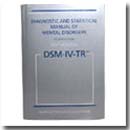 Bigotry may seem like crazy behavior to most people, but could it be an actual psychological disorder? Work is underway this year to revise the Diagnostic and Statistical Manual of Mental Disorders, and there's discussion about incorporating an additional category known as "extreme bias." Host Bill Radke talks to Dr. Edward Dunbar about the issue. (01/07/2006) Will your clothes soon control your cell phone or I-Pod? Weekend America's technology reporter Rick Karr talks to fashion and technology designers who say it's a possibility that isn't too far into the future. (12/10/2005) Online resources:
It wasn't easy avoiding the news this week about the teenager who died after kissing her peanut-eating boyfriend. Peanut allergies can be especially life threatening and are a constant worry for parents of young children with the condition. Host Barbara Bogaev talks to parent Gaby Wood of New York about what she goes through to keep her peanut-allergic child safe. Then, just how prevalent are peanut allergies? Host Bill Radke talks with Dr. Scott Sicherer about America's overall increase in allergic symptoms. (12/03/2005) Online resources:

This week, the Vatican affirmed its ban on priests with "deep seated homosexual tendencies." How is this playing out in the church? Weekend America has an update from psychologist Thomas Plante, who screens recruits for the priesthood. (12/03/2005) Online resources:
The process of choosing a Medicare drug benefit plan is not simple for a lot of people. There's a lot to choose from, and it has been overwhelming and tedious for many beneficiaries and their families. With this in mind, host Bill Radke hits the streets of Los Angeles and discovers -- from cold cuts to cell phones -- there's no shortage of choices to be made. (11/19/2005) Online resources:
Christine Antoldi Sossi, of Oceanside, New York was diagnosed with an aggressive form of breast cancer five months ago. Sossi was blind-sided by this diagnosis. She's thirty-eight years old and has four kids at home -- including a baby. Meg Yoniack lives in the same community as Christine and she beat the same type of cancer six years ago, in her late 40s. Host Bill Radke speaks with the two women about their shared battle. (11/19/2005) Online resources:

Once a month, Weekend America brings together two people to weigh in on a stranger's moral conundrum. Host Bill Radke talks with Sherry Lansing, former chief of Paramount Pictures and William Hurlbut, a professor of medicine at Stanford, and a member of the President's Council on Bioethics, about the hot-button issue of kids and vaccinations. The subject of the discussion is Dr. William Zavod, a pediatrician from suburban Philadelphia. Dr. Zavod says that if parents refuse immunizations for their children, he cannot be a part of their children's medical care. The Solomon Squad weighs in on this moral quandary. (11/12/2005) Online resources:

Next week, smoking restrictions are back on the ballot. Citizens of Washington State will vote to ban smoking within 25 feet of all public buildings. If the measure goes through, smokers will be left with even fewer places to indulge their habit. Weekend America host Bill Radke talks to a smoker in Seattle for his reaction. (11/05/2005) Online resources:

American Public Media technologist Chris Spurgeon shares his favorite video podcasts with Weekend America host Bill Radke. (11/05/2005) Online resources:
» Tiki Bar TV Web site
» Direct link to the Tiki Bar TV video podcast » Direct link to the Tiki Bar TV video podcast (iTunes): » Statler & Waldorf From the Balcony Web site » Direct link to the Statler & Waldorf From the Balcony video podcast » Direct link to the Statler & Waldorf From the Balcony video podcast (iTunes) Heidi Cullen has been tracking the aftermath of the Gulf Coast storms. But the Weather Channel's first-ever climatologist is collecting data to see how, or if it can be connected to global warming. She joins host Barbara Bogaev to talk about the challenges in her work. (10/29/2005) Online resources:
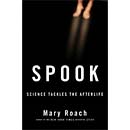
It's a question man had always wondered about: "Is there life after death?" It's a question science writer Mary Roach attempted to answer for herself as she wrote her new book, Spook. She talks with host Bill Radke about the extraordinary things she experienced as she attempted to find out. (10/29/2005) Online resources:
As flu season gets underway, people become more conscious of germs, where they might be and how to avoid contact with them. Microbiologist Chuck Gerba thinks about germs all the time and spent four years testing for them everywhere. Weekend America invited him give our workplace the once-over. (10/22/2005) Online resources:
Getting spooked by all of the reports about Avian Flu? Some people are calling it this year's SARS scare. Toronto doctor Allison McGeer knows all about SARS. In 2003, the disease was spreading in Toronto hospitals. She was treating patients with the virus, until she caught it herself. She's fine today and joins Weekend America host Bill Radke to share what she learned about highly publicized diseases and the fears that surround them. (10/15/2005) Online resources:
Los Angeles has an alligator problem. Conveniently, a Louisiana man displaced by hurricane Katrina has come to the rescue. Independent producer Dan Konecky has the story of gator-wrangler Thomas "T-Bone" Quinn and his brush with stardom as he tries to coax an abandoned pet alligator from a Los Angeles area lake. (10/15/2005) Online resources:

The human brain is one of the last frontiers in science. With powerful tools like magnetic resonance imaging, researchers are gaining new insights into regions and zones that determine not only our abilities and behavior but personal preferences as well. Weekend America science correspondent Rebecca Roberts explains how imaging machines work. (10/08/2005) This weekend there's a race, with a 150-mile course, big prize money and state-of-the-art vehicles. The only things missing are the drivers. It's the DARPA Grand Challenge, a race sponsored by the Defense Department to find the best unmanned robotic vehicle for the battlefield of the future. American Public Media producer Brett Neely follows a few teams through the qualifying rounds. Then, Weekend America host Barbara Bogaev talks with Professor Gaurav Sukhatme, co-director of the Robotics Research Lab at the University of Southern California, about the future of robotic vehicles. (10/08/2005) Online resources:
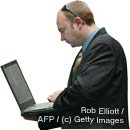
Wireless technology has made it possible to access the Internet from almost anywhere. It's also made it possible to gain access to other people's connections, by accident or on purpose. Some people have made a point of looking for open nodes to access wireless networks. It's called "war driving" and it's raising security concerns. Weekend America technology correspondent Rick Karr takes his computer on the road to see what he can get into. (10/08/2005) Online resources for war driving:
Lists of free WiFi hot spots:
» The wardrivers' database
» www.freenetworks.org (noncommercial site) » www.wififreespot.com (commercial site) Articles:

There are thousands of podcasts available on the Web — music shows, business programs, public radio. American Public Media technologist Chris Spurgeon talks about the phenomenon of podcasting and brings in a few of his favorites. (10/01/2005) Online resources:
If Gennifer Choldenko had to pick a metaphor for her sister's life, it would be Alcatraz. Her sister Gena was autistic, trapped in an internal prison with no means of escape. It inspired her to write a children's book called Al Capone Does My Shirts, about a young boy growing up with an autistic sister. Weekend America host Barbara Bogaev talks with Choldenko about living in the shadow of autism. Then, Barbara gets a parent's perspective from Susan Senator. Her book, Making Peace with Autism, shares her experiences in raising an autistic son. (10/01/2005) Online resources:
» Susan Senator Web site
» Susan Senator's book, Making Peace with Autism: One Family's Story of Struggle, Discovery, and Unexpected Gifts, is available at the Public Radio BookSource. » Gennifer Choldenko Web site » Gennifer Choldenko's book, Al Capone Does My Shirts, is available at the Public Radio BookSource. » Alcatraz Island (NPS.gov) » Autism Society of America Fifty years after the U.S. tested the first atomic bomb, science and art collide in a new opera about that pivotal moment in history. Weekend America host Barbara Bogaev talks with science correspondent Rebecca Roberts about Doctor Atomic and the birth of the bomb. (10/01/2005) Online resources:
Gas prices have eased a bit during the past week, but a lot of drivers are still looking for ways to pinch pennies when they're behind the wheel. Weekend America gathered a panel of experts to offer their advice on the most efficient ways of getting from Point-A to Point-B. (09/17/2005) Doctors aren't perfect and neither is the work they do. Medical errors take their toll on everyone involved, and thousands die every year as a result. The medical industry is looking into the problem, but how are patients who survive getting on with their lives? Weekend America host Bill Radke talks with Julie Smith about how a routine surgery turned into a battle with deadly bacteria. Then, he talks with two doctors, a veteran and a rookie, about Julie's story and what to do when you make a mistake. (08/27/2005) Online resources:
Identity is a mix of genetics and culture, and most of us think we know who we are -- but do we really? With the advent of the latest technology, some people are testing their DNA to get at that most personal of truths -- their ancestry. The journey can be as frustrating and rewarding as the result. Weekend America host Bill Radke talks to Christopher Rabb of Philadelphia and Sonya Loya of Ruidoso, New Mexico about how DNA testing and genealogical research shapes our identity. (08/27/2005) Online resources:
With the recent changes in the Supreme Court, the abortion issue and its landmark case, Roe v. Wade, are back in the news. It isn't likely in the near future, but one day Roe v. Wade might be revisited, or completely reversed. There's no legal precedent for such a ruling and the abortion debate would return to the states where old laws still linger on the books. Weekend America host Barbara Bogaev speaks with Cynthia Gorney, author of Articles of Faith: A Frontline History of the Abortion Wars, about the implications of a world without Roe. (08/27/2005) Online resources:

It's a new school year, and a new batch of kids will be going to their first ever sex-ed class. As far back as the 1920s, teachers have used educational films to help broach the subject. Weekend America substitute host Alex Cohen talks with two modern day video producers -- Amanda Ramirez, a student who co-wrote an award-winning sex-ed video called Toothpaste, and John G. Young, a professional sex-ed video producer at Human Relations Media -- about their experiences making sex-ed videos today. (08/20/2005) Online resources:
» Scenarios USA website

"Remixing culture" has become a buzz phrase over the last few years. DJs sample musical riffs, writers borrow characters from older stories. Weekend America's technology and culture correspondent, Rick Karr, tells us about the latest in remixed culture -- artists are giving their fans the elements of their work to play with and reinvent. Plus, Weekend America host Bill Radke talks to Classics professor Walter Englert of Reed College about the ancient remixes of Greece and Rome. (08/20/2005) Online resources:

In January 2000, the FCC authorized the Low Power FM radio service, designed to allow individuals and community organizations to operate non-commercial radio stations with transmitters of dozens of watts, instead of the 1000 watts used by normal FM stations. Producer Jennifer Moore traveled to Northampton, Massachusetts, to witness the birth of WXOJ, the city's first microstation. (08/13/2005) Online resources:
In the future, average people will travel into space, but not necessarily by shuttle. They'll get there by elevator if one entrepreneur has his way. Weekend America host Barbara Bogaev interviews Michael Laine about the next stage in galactic transport. (08/06/2005) Online resources:
South Korean scientists successfully cloned a dog for the first time. If you could clone man's best friend, would you? Weekend America host Bill Radke goes to a dog park to find out how dog owners feel about duplicating Fido. (08/06/2005) Online resources:
The results are in. Scientific studies show that Echinacea, a popular herbal remedy, has no effect on the common cold. Weekend America host Bill Radke visits an herbalist to find out how people are taking the news. (07/30/2005) Online resources:
One hundred years ago, in 1905, Albert Einstein had a miracle year. He published four major papers including his landmark theory of relativity. But despite his revolutionary accomplishments, he didn't win that year's Nobel Prize. Weekend America science reporter Rebecca Roberts asks why and profiles the man who won instead, Philip Lenard. (07/23/2005) When science takes a leap forward, ethical debates often take center stage. Stem cell research is the latest to go through the process. Not so long ago, in vitro fertilization was contested. Weekend America host Barbara Bogaev talks with Robin Marantz Henig, the author of Pandora's Baby: How the First Test Tube Babies Sparked the Reproductive Revolution. (07/16/2005) Online resources:
Computers are powerful tools but they still can't stimulate all of our senses, like smell and taste. But is that likely to change in the near future? Weekend America's technology reporter Rick Karr investigates the state of sensory enhanced computing and tells Weekend America host Barbara Bogaev what he found out. (07/16/2005) Online resources:
In recent months, prosthetic science made a giant leap forward and Jesse Sullivan is reaping the benefits. He's a double amputee with a state-of-the-art arm. But he's regained something else as well. Weekend America host Bill Radke talks with Jesse about becoming the first bionic man. (07/09/2005) Online resources:
» Watch a video demonstration of Jesse's bionic arm:
High-bandwidth video [may take 40 to 50 seconds to load] Low-bandwidth video [may take 40 to 50 seconds to load] » Rehabilitation Institute of Chicago » Introducing Jesse Sullivan, the World's First "Bionic Man" What's inside a comet? NASA hopes to find out when project Deep Impact takes a sample from one on July 4. Weekend America correspondent Rebecca Roberts talks with an investigator on the project, Peter Schultz of Brown University. (06/25/2005) Online resources:
You know those cool hybrid cars cruising the nation's highways? Dr. Victor Wouk developed the technology for enviro-friendly wheels back in the 1970's. Weekend America host Barbara Bogaev goes for a ride with Dr. Wouk. (06/18/2005) Online resources:
Marketplace's Nate DiMeo was diagnosed with a rare migraine condition. He doesn't get headaches, but he suffers from a visual disturbance that never goes away. DiMeo tells host Bill Radke how he found a computer to help him accomplish a common everyday task -- reading. (06/18/2005) Online resources:
Some doctors track diseases the way policemen chase criminals. Last month, a strange virus appeared in transplant patients. The medical community was stumped until one doctor put all the pieces together. Weekend America correspondent Rebecca Roberts reports on what it takes to solve a medical mystery. (06/11/2005) Dealing with a cancer is daunting. Sometimes dealing with treatment is worse. Sue Mell discovered this during her own battle with breast cancer. Last spring, she reached the end of her radiation treatment. In a moving remembrance, she recalls the toughest part of this difficult situation. (06/11/2005) The struggle to save endangered species has found new life. Weekend America correspondent Matt Wells visits a frozen zoo where DNA from today's animals is stored in canisters for a future thaw. Then, Weekend America host Bill Radke talks to two scientists about the usefulness and practicality of frozen zoos. (05/28/2005) Online resources:
Some of the most interesting discoveries are made by accident. In a basement lab at UCLA, scientists studying nanotechnology discovered sounds coming from the Petri dish. Producer Ben Adair brings us the story of two graduate students who decided to make a symphony from cell sounds. (05/28/2005) Online resources:
Video gaming is a booming business. But is that all it adds up to? Game creators have a new, loftier goal -- to make you feel something. Weekend America correspondent Alex Cohen takes a trip to gamers' ground zero and lives to tell the tale to Weekend America host Barbara Bogaev. (05/28/2005) Online resources:
Combating the psychological effects of warfare can be a problem for veterans returning from Iraq. Host Bill Radke straps on virtual reality goggles to test a new treatment designed to help soldiers deal with combat stress, and he talks with military experts about the problem. (04/23/2005) Online resources:
In the wee hours of Sunday morning, you just might notice a dimmer moon. "So what?" you might say. But you'd have a different view from space. Only three people have watched the Earth eclipse the sun, the crew of Apollo 12. Host Barbara Bogaev talked with astronaut Dick Gordon about the view. (04/23/2005) Online resources:
What is native American? When it comes to the world of plants, host Barbara Bogaev learns it all comes down to a matter of language as she speaks with botanist Rick Burgess and marine biologist David Secord. (04/23/2005) Online resources:
Who hasn't fantasized about giving up a desk job and taking flight? Naturalist Alan Tennant and pilot George Vose don't have to. They've been tracking the migrations of Peregrine falcons all around the world. Producer Jesse Boggs tagged along for one of their flights to bring us this story -- which may soon become a Hollywood movie. (04/23/2005) (Additional support for Jesse Boggs' story comes from the Web site Hearing Voices and from the Corporation for Public Broadcasting.) Online resources:
 Back in the old days, Perry Mason could solve a murder with motive alone. But with all the new technology used to solve crimes, has motive fallen by the wayside? Weekend America talked with a forensic scientist and a crime writer about the rivalry between motive and science. (04/16/2005) Producer Nancy Farghalli loved walking the streets of New York. After moving to Los Angeles, she discovered the city wasn't so pedestrian-friendly. She got herself a pedometer to help stay in stride. What she didn't count on was how it would reveal her true nature. (04/16/2005)  In the past couple of months, many painkillers have been pulled off the shelves due to safety concerns. What does that mean for people who suffer pain without them? Weekend America looks at the complicated science of pain, and what new research might tell us about treating it. Plus how one woman is coping with the chronic pain from a broken back. (04/16/2005) Photo: Kristian Dowling / (c) Getty Images Online resources:
Science reporter Rebecca Roberts explains the science behind pain by experimenting on guest host Alex Cohen. (04/16/2005) It's been 50 years since Jonas Salk gave us the Polio vaccine. We'll talk to Edna Hindson about her painful childhood memories and the lasting effects of the disease. Plus a demonstration of the iron lung from the man who's father invented it. (04/09/2005) Online resource:
Web guy Chris Spurgeon chose The Well for the website of the week, but for him, it's more like the website of the decade. (04/02/2005) Online resources:
Tivo has revolutionized the way Americans watch TV. It lets us skip commercials and watch a show anytime we'd like. Rick Karr joins us to answer the question: "What would happen if everyone had a Tivo?" (04/02/2005) Online resources:
It wasn't a light bulb that went off in Sheila Kennedy's head; it was more like sunlight. She's a Boston architect who's trying to figure out ways to use natural light more effectively inside buildings. (04/02/2005) Online resources:
If an author really admires another's writing and puts it in his next book, that's plagiarism. Right? But if a designer likes another's hemline and uses it in his Spring collection, it's a compliment. Reporter Rick Karr has been taking a look at copyright protection in the world of fashion. (03/19/2005) Online resources:
The University of Wisconsin is doing a study on the effects of meditation on the brain, and it turns out that people who spend time meditating might change the way that their brains function. Reporter Rebecca Roberts discusses with host Barbara Bogaev what she found out. We'll also hear from Buddist monk and test subject Matthieu Richard. (03/19/2005) Online resource:
People can overcome most everything for love -- money, family, religion.but distance? Weekend America met one couple that's trying to bridge the thousands of miles between them with the help of technology. They've synchronized almost every detail of their lives and broadcast sound recordings of their days on the Internet, all in the name of love, and art. (03/19/2005) Online resource:
There's a new technology for treating bulimia that's the same one that's treated heart patients for years. Barbara Bogaev talks with a patient who's had the treatment, and Bill Radke talks with the researcher who developed the technology. (03/12/2005) Online resource:
Who doesn't have a bad breakup or an embarrassing moment that they'd rather forget? Doctors can prescribe medication that dulls the pain of a traumatic memory for people who have survived terrible experiences. How do they draw the line between the experiences that should be diminished, and the experiences that make us who we are? Host Bill Radke talks with a doctor about the ethics behind the medicine. (03/12/2005) Online resources:
On Monday, a drug called Tysabri that was used to treat Multiple Sclerosis was pulled off the market. For thousands patients pinning their hopes on its success, the news was devastating. Barbara Bogaev talked to a patient and a doctor about what life in the MS community will be like without the drug. (03/05/2005) Online resources:
Weekend America's web guy, Chris Spurgeon, delves into the world of museum websites. (02/19/2005) Museums mentioned:
What did Americans hear on their radios when the nuclear bomb was being tested? Weekend America visited a museum with relics from the testing of the nuclear bomb that's opening this weekend in Las Vegas. (02/19/2005) Online resource:
When Jay Truman was a kid, he played "Atomic War" instead of "Cowboys and Indians." He grew up downwind, 90 miles from a test site. He talked with Barbara Bogaev about his memories from childhood and what it's like to watch nuclear tensions escalate around the world. (02/19/2005) Online resource:
Drugs like Ritalin, Paxil or Inderal are meant to treat people with diagnosed illnesses like Attention Deficit Disorder, anxiety and heart disease. But lately, people without those problems have started taking those drugs too. It's a practice called cosmetic psychopharmacology. Reporter Laila McClay went to New York City to talk to some top musicians about their pharmacological treatments for stage fright. (02/12/2005) Online resource:
"Mozart in the Jungle" (Atlantic Monthly Press)
Blair Tindall's Web site More information about Inderal (Drugs.com) Fact sheet on Propranolol (WebMD.com) The Hubble Telescope's days are numbered. NASA has set aside $75 million to design a "kamikaze" robot. Basically, it's a rocket designed to attach itself to the Hubble and steer it out of its orbit and into the ocean. What's it like to be the Hubble hitman? Barbara and Bill talk with Preston Burch, the project's manager. (02/12/2005) Online resource:
NASA budget would kill Hubble (CNN.com)
Continuing our series on cold, Barbara Bogaev traveled to the Jet Propulsion Lab in Pasadena, California to find out how to design a vehicle that can survive extreme cold. Barbara asked an atmospheric scientist to imagine what it's like in the chilly southern hemisphere of Mars. (02/05/2005) More from this series:
A study released this week used a mathematical formula to pinpoint the saddest day of the year, January 24. Weekend America talks with people about what they do to avoid the winter blues. (01/22/05) Online resource:
The Biosphere 2, a failed science experiment in the middle of the Arizona desert, is up for sale. Bill Radke talks with Jayne Poynter, a member of the original Biosphere 2 team, about her memories of life inside the 3-acre dome. (01/22/05) Online resource:
The island of Hawaii is overrun with small Coqui frogs, an invasive species that threatens the entire ecosystem of the island as well as the hearing of local residents. This week, Harry Kim, the mayor of the county of the big island of Hawaii, made a plea for a state of emergency declaration and asked for $2 million to launch a program to combat the frogs. We spoke to him about what it's like to live amidst the cacophony. (01/22/05) Online resources:
more science, health and technology in the archive
|
... on our December 15 broadcast:
» Weekend America
 Enhanced Podcast:
Skip back and forth through stories, see images on iTunes and on your iPod, all with better sound quality. Enhanced Podcast:
Skip back and forth through stories, see images on iTunes and on your iPod, all with better sound quality.
» The Huckabee Mystique: See video of Mike Huckabee and Chuck Norris.
» Another Great Moment in Small Talk: Read how Charlie Schroeder became an unpopular "tool" because of Borat.
» Listener Letters: Renewable Christmas Trees: Read listeners' alternate endings to "Puff the Magic Dragon."
» Sign Up for the Weekend America weekly newsletter: Find out what's on the upcoming show, and listen to the most popular previous segments.
|
Weekend Weather
From the July 5 broadcast
-
Awful Car Night
Auburn, N.Y.
-
National Brewery Museum Opening Ceremony
Potosi, Wis.
-
Sand Sculpture Contest
Bruce, S.D.
-
Oregon Coast Geezer Games
Newport, Ore.
-
Annual Coolest Fourth of July Celebration
Fort Davis, Texas
-
Maui Invitational Band Festival and Blues Fest
Wailuku, Hawaii

Find out what's on the upcoming show, listen to the most popular previous segments, and be the first to participate stories about our listeners. » Subscribe to the Newsletter |
This week: Have you exper-
ienced any strange seasonal changes: springtime plants sprouting; squirrels sunbathing? Let us know... |






